No products in the cart.
Keeping Your Pooch Safe During Fireworks!
Keeping Your Pooch Safe During Fireworks!
- BADDogs Inc
Fireworks fear! Independence Day is coming, and for many of us, it’s day of fun and relaxation to enjoy with friends, family and neighbors.
But for many of our pets, it can be a real horror show, with random explosions, scary flashes of light and the stink of gunpowder all around. Some dogs take this all in stride and hardly notice a thing. But many others spend the day quivering, shaking, drooling, hiding or trying to run away. What can we do to help our pets get through the experience without so much emotional pain?
I watch our local social media community pages, blogs and other “conversations”, and shudder at some of the well-meaning advice that people give each other. And while many of these “aids”, “remedies” and containment solutions may work well for some, they can be completely ineffective or downright terrifying or unhealthy for others. It can be tough to know the right thing to do in your situation, and what will be right for your dog.
As the only certified dog behavior consultant in the Inland Empire, I want to make sure that more families and their dogs get better help so our dogs can make it through the hectic holiday safely. Here’s a few things you can do to help your pooches through this potentially terrifying event.
What You Can Do
First, if you know your dog is fearful of fireworks, thunder or other random, loud noises, then it’s probably a good idea to check with your veterinarian as soon as possible and ask them to prescribe some anxiety medication. Anxiety meds actually help the dog control their fear reactions to the scary sounds, sights and smells. Anxiety meds are not the same as sedatives, which you don’t want, as sedatives tend to make the anxious behaviors worse, not better.
On days when fireworks are likely to happen, schedule exercise walks for early in the day, and then later in the evening, once the worst of the festivities are over.
More dogs run off and go missing during fireworks holidays than any other time, so make sure your doors, windows and gates are secure to prevent your dog from escaping in a panic. Also, make sure your dog is wearing a collar with ID on it, so if they get loose and run off it will make it easier for anyone who finds him to get him back home to you. Microchipping is a great idea, but nothing beats visible ID since you don’t need an electronic device to read a collar tag.
Some dogs prefer a safe place to hide during the festivities, so think about making your dog a quiet place in the interior of your home, like a bathroom or closet without windows. I don’t advise confining your dog to a crate, as they may have a panic attack and injure themselves trying to escape.
Because fireworks have visual impacts as well, it’s a good idea to draw the curtains and close the blinds and shutters so your dog isn’t startled by the bright lights.
Playing a white noise machine or radio with mellow music at a loud enough volume to drown out some of the noise can be helpful.
Make sure someone stays home to keep your dog company and monitor his reactions to the fireworks. Dogs who are left alone during these terrifying events can have panic attacks and make the problem much worse.
When the dog shows signs of distress, feel free to comfort them. Sometimes, demonstrating that you’re OK with what’s going on can make things easier for your dog. If there are super special treats your dog really loves, consider having a good quantity on hand; many times, dogs can feel better about scary things if wonderful stuff happens along with them.
Of course, it’s always possible to desensitize your dog to the sights and sounds of fireworks, but this is typically not a quick project. We work with tons of clients and their dogs to help them learn to tolerate these events, and we can help you too!
I hope your Independence Day holiday is safe and enjoyable, for both you and your dog!
Share This Post?
Facebook
Twitter
Pinterest
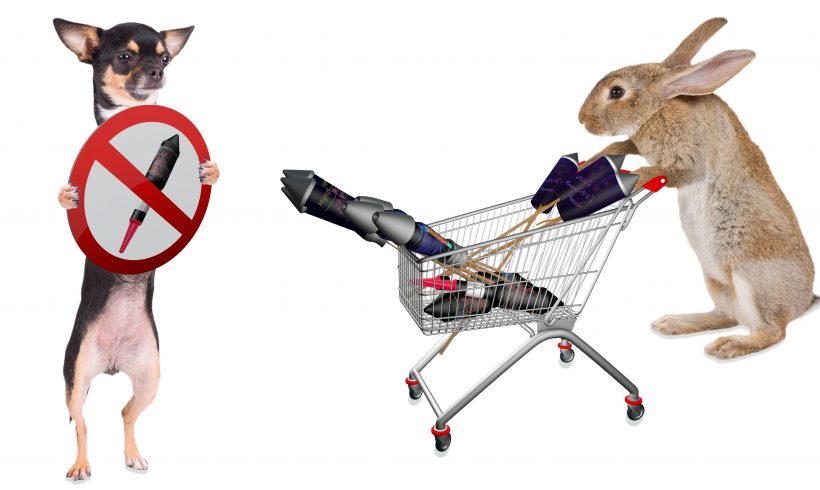
Recent Articles
About Author
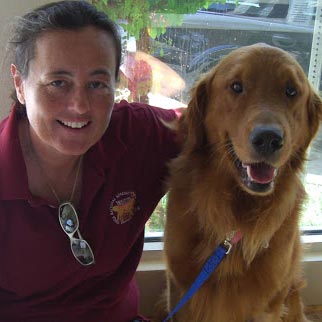
Barbara Davis
I’ve been working with dogs and their people for more than 30 years! I’m certified in dog training by the Certification Council for Professional Dog Trainers, and certified as a Dog Behavior Consultant through the International Association of Animal Behavior Consultants (I’m also a founding member, currently Chair of Dog Division and serve on the faculty of their behavior consulting program, Animal Behavior Consulting: Principles and Practice). I’m also certified in training and behavior by the Association of Animal Behavior Professionals, and serve on their advisory board. I’m pleased to participate as an AKC CGC/S.T.A.R. Puppy program as an Evaluator.
Products
-
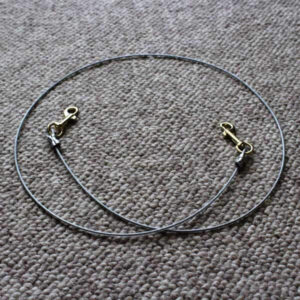 Teenie Tethers
$9.95 – $11.95Rated 0 out of 5
Teenie Tethers
$9.95 – $11.95Rated 0 out of 5 -
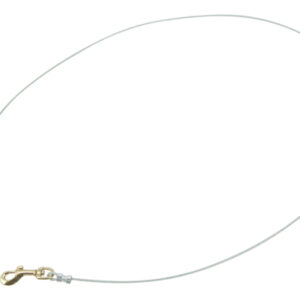 Trainer Packs by Pet Tethers
$45.00 – $70.00Rated 0 out of 5
Trainer Packs by Pet Tethers
$45.00 – $70.00Rated 0 out of 5 -
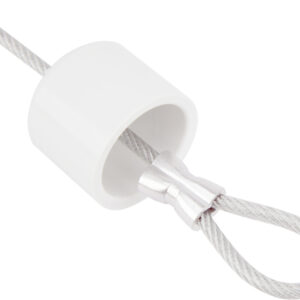 Dor-Stopz by Pet Tethers
$11.95 – $65.00Rated 0 out of 5
Dor-Stopz by Pet Tethers
$11.95 – $65.00Rated 0 out of 5 -
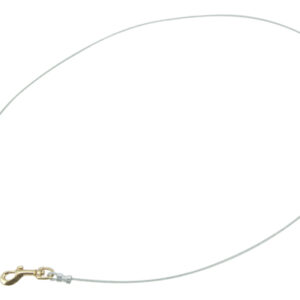 Regular Pet Tethers
$10.95 – $14.95Rated 0 out of 5
Regular Pet Tethers
$10.95 – $14.95Rated 0 out of 5
